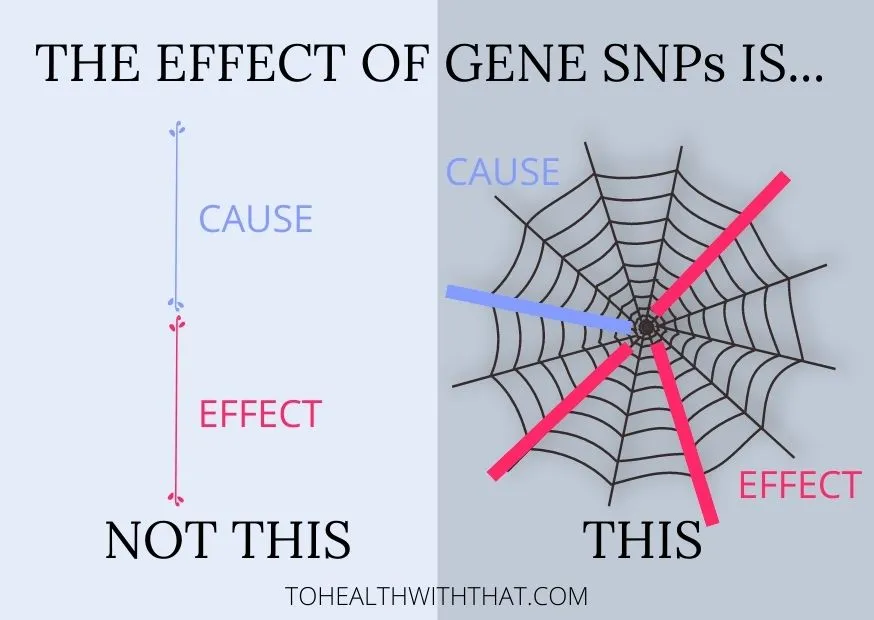This week I want to start a mini-series of talks about other gene SNPs with or without MTHFR.

I actually want to start it out with a disclaimer, and this is something that you’ve heard me say before, but it bears repeating.
You are more than your genetic report, and just because you have a polymorphism in a gene doesn’t actually mean that it’s causing problems in real life.
We like linear ideas in medicine because they’re easy to get our heads around. Linear ideas like this polymorphism does this concrete thing in a predictable and repeatable way. The truth, however, is that most of the genes we are talking about are part of a complex web of overlapping functions. There are loops and redundancies and always, always, at least 15 ways to do the same thing. This means that linear in medicine is largely a myth. It’s a popular myth, but a big fat lie none the less. In truth, all of these processes are more like a web and pulling one strand might lead to a tension on the other side of the web, might pull four or five unexpected places, and might have no impact because of other strands that are being pulled at the same time. The tremendous forces that shaped and designed your body have had eons to perfect it, so you are far more vast and strange than you have ever believed yourself to be.
I feel like Ben Lynch summed this up really clearly in his book Dirty Genes. He gets really clear that genes can BE “dirty” in that they have polymorphisms of some kind, or that they can ACT “dirty,” meaning they’re perfectly average wild-type genes but some environmental or life stressor is causing them to act like they have polymorphisms. LIkewise, genes with polymorphisms can ACT “clean” if your lifestyle and nutrition around that gene are optimized.
This acting clean is precisely why we’re talking so much about balancing methylation, because balancing your methylation means your MTHFR polymorphism becomes silent – the MTHFR gene is now acting “clean.”
This is really important for two reasons.The first, is that it’s easy to get caught in the trap of trying to fix a piece of paper and disregarding your symptoms and how you feel as a human in the process. What I mean by this is that people start to take supplements for gene SNPs, even when it’s unnecessary and cumbersome becasue they’re paying more attention to what the genetic report says than to what they feel in real life.

What you feel in real life always trumps genetic reports, always. It’s entirely possible to have a gene SNP that is normalized already by nutrition and lifestyle so it isn’t causing harm, but taking a supplement for that gene might cause harm in that pathway or elsewhere.
The other reason is that not all of us have genetic reports. It’s entirely possible to work on the symptoms that you’re having that sound like a “dirty” gene without actually knowing what the gene SNP is on paper. At the end of the day, what’s on paper isn’t the point. The thing we’re working on is how you feel as a human.
So each week we’ll discuss a different polymorphism, the symptoms you might see with that polymorphism and some beginning steps about how to work with that. Also, we’ll talk about how it relates to the MTHFR gene because MTHFR really is foundational to all of this.
What I do want to make clear is that following the basic steps to balance your methylation will help you to balance 85% of the rest of this as well. There are a few particulars that might take extra steps, but if you’re following the plan, you’re already working on all of the cycles that interconnect with the methylation pathway. You are already working on everything relating to folate, methylation, glutathione, neurotransmitter formation, and circulation via nitric oxide. Balancing methylation even helps with many detoxification-related processes and hormone balance. So if you’re following the plan, you’re 85% of the way there and now you just need to refine with details.
That is exactly why the foundations of this journey are so important. What are the foundations, you might ask? The foundational steps are:
- Getting the folic acid out of your diet and supplements. At least 90%
- Filling your diet with good food sources of natural folate (not foods fortified with folic acid)
- Adding a good background of other B vitamins and a form of B12 that works for you
- Adding a methylation driver – 5-LMTHF is the best becasue it’s exactly what your body needs, but if you don’t tolerate it, then folinic acid or SAMe are other great choices.
- Cleaning up your lifestyle to minimize toxin exposure, hydrate, support gentle detox, boost antioxidant intake, and balance your protein intake and your activity level.
If you’ve done those things you are 85% and possibly even more of the way there. After that, it’s all little detail things but a solid foundation is set.
So, for the next three months, buckle your seatbelts because we’re going to start a whirlwind tour of commonly tested gene SNPs, what they do, and how to work with them.
Thank you so much for listening today and if you haven’t already joined Genetic Rockstars, consider doing so. Helping other people to heal has been shown to increase your own rate of healing across a variety of physical and mental health conditions and MTHFR is no exception. The biggest thing you can do for yourself is to share your story, laugh and cry with other MTHFR folks, and be there for your healing community.
MTHFR is a common genetic mutation that can contribute to anxiety, depression, fatigue, chronic pain, infertility, and more serious conditions like breast implant illness, heart attack, stroke, chronic fatigue syndrome, and some types of cancer. If you know or suspect you have an MTHFR variant, schedule a free 15-minute meet-and-greet appointment with MTHFR expert Dr. Amy today.
Book Your Appointment
